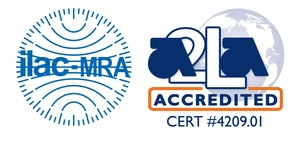Aviation Turbine Fuel (Military F24)
Schedule: March, October
Reduced Price

Accredited Proficiency Testing Provider*
This program is accredited in accordance with the recognized International Standard ISO/IEC 17043: 2010 Conformity Assessment - General Requirements for Proficiency Testing, by the American Association for Laboratory Accreditation. Certificate Number: 4209.01
Why Should Your Laboratory Participate?
About Astm International Committee D02 On Petroleum Products, Liquid Fuels, And Lubricants
About The Program
ASTM’s Aviation Turbine Fuel (Military F24) Proficiency Testing Program provides laboratories with a statistical quality assurance (SQA) tool, enabling them to compare, improve, and maintain, a high level of performance in the use of ASTM methods with other laboratories worldwide. This program is designed to test turbine, aviation, and kerosene type fuels that meet NATO F24 F-34 specifications. Testing requirements under this program are designed to meet the MIL-STD-3004 MIL-DTL-83133 standard.
Conducted two times annually, this program provides a different commercial sample, electronic report forms, and test instructions for each test cycle. Your laboratory performs the tests that you normally conduct within your own facility using the specified ASTM methods cited in the program.
Samples, test instructions and data report forms are distributed electronically to each participant on the date samples are distributed. Labs have approximately 8 weeks to submit test data with the final statistical summary reports being electronically distributed in approximately 25 business days. All data and related information generated from the program is coded to maintain lab confidentiality.
Why Should Your Laboratory Participate?
ASTM's Proficiency Test Program provides you with:
- A useful and meaningful statistical quality assurance tool to monitor the strengths and weaknesses of your laboratory's performance in conducting testing.
- The resource you need to satisfy proficiency testing elements of laboratory accreditation.
- A periodic comparison of test results with other participating laboratories.
Should you have an issue with your published results, please write to ptp@astm.org with your lab number and account number.
Test Materials
Two 1 gallon containers of fuel will be used in the program for each test cycle.
Test Parameters
|
D3242 |
Acidity in Aviation Turbine Fuel, Total Acid Number |
|
D5001 |
BOCLE Lubricity |
|
D976, D4737 |
Calculated Cetane Index of Distillate Fuels |
|
D130 |
Copper Strip Corrosion |
|
D1298, D4052 |
Density, or API Gravity |
|
D86, D2887, D7345 |
Distillation |
|
D4952 |
Doctor Test |
|
D2624 |
Electrical Conductivity of Aviation and Distillate Fuels |
|
D93, D3828, D56 |
Flash Point |
|
D4176 |
Free Water Particulate Contamination in Distillate Fuels |
|
D2386, D5972, D7153, D7154 |
Freezing Point |
|
D5006 |
Fuel Systems Icing Inhibitor (Ether Type) in Aviation Fuels |
|
D381 |
Gum Content in Fuels by Jet Evaporation |
|
D1319 |
Hydrocarbon Types in Liquid Petroleum, Aromatics |
|
D3701, D3343, D7171 |
Hydrogen Content of Aviation Turbine Fuels |
|
D445, D7042 |
Kinematic Viscosity at -20°C |
|
D3338, D4809, D4529 |
Net Heat of Combustion, MJ/kg BTU/lb |
|
D2276, D5452 |
Particulate Contaminant in Aviation Fuel, Filtration Time |
|
D156, D6045 |
Saybolt Color of Petroleum Products |
|
D1322 |
Smoke Point of Kerosine and Aviation Turbine Fuel |
|
D3227 |
Sulfur, Mercaptan |
|
D129, D1266, D2622, D3120, D4294, D5453,D7039 |
Sulfur, Total Percent |
|
D3241 |
Thermal Oxidation Stability of Aviation Turbine Fuels |
|
D1094 |
Water Reaction, Interface Rating |
|
D3948, D7224 |
Water Separation Index |
Distribution Of Samples
Test samples are prepared and distributed for ASTM International by Clark Labs in Jefferson Hills, PA. Program registration fees include the cost of shipping the test samples to U.S. participants or, for international participants, to a third-party shipping agent located in the U.S.
IMPORTANT for International participants: You have the following options for receipt of samples:
- Ship through a third party shipping agent - Provide ASTM International with the complete contact information of a designated Shipping Agent located in the U.S. who will be responsible for shipping samples from the U.S. to your facility. Participants are responsible for making financial and shipping arrangements directly with the shipping agent.
- Please be advised that when samples are shipped, an e-mail is sent only to the contact of record on your ASTM PTP account. It is the customer’s responsibility to advise their designated shipper that the sample has been shipped.
- We cannot permit shipping agents to pick up samples at our distributors’ warehouses.
- Ship directly from the sample distributor via UPS, DHL, or FEDEX - Provide ASTM International with your shipping account number to cover shipping charges. Check that your carrier will deliver the test materials to your location. Materials classified as Hazardous may have restrictions.
- You are responsible for additional fees charged-back to our distributor for any reason relative to your sample shipment including, but not limited to, fees for fuel surcharges, missing/invalid account numbers, dangerous goods, remote area delivery, and multiple delivery attempts.
- Product Shipment Specs
- Quantity: 2x1 Gal
- Shipping Weight: 10lbs
- Dimensions: 8x8x11" x2
- ECCN: EAR99
- Harm Code: 2710.12.1520
- Generic SDS
Program Requirements
Participation is on an annual fee basis and open to all laboratories. Registration fees must be paid in advance to participate. Testing must be performed within the participant's laboratory facilities. A laboratory does not need to perform all the program tests to participate. All data and related information generated from the program is coded to maintain lab confidentiality.
About Astm International Committee D02 On Petroleum Products, Liquid Fuels, And Lubricants
About ASTM International COMMITTEE D02 ON PETROLEUM PRODUCTS, LIQUID FUELS AND LUBRICANTS provides the technical direction for the program. Test information generated through the program is utilized by Committee D02 to determine if modifications to ASTM International methods or new methods are warranted and to analytically review program test results. (All data and related information generated from the program is coded to maintain lab confidentiality.)
